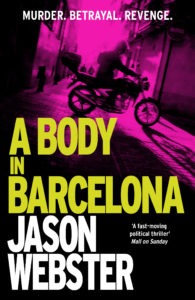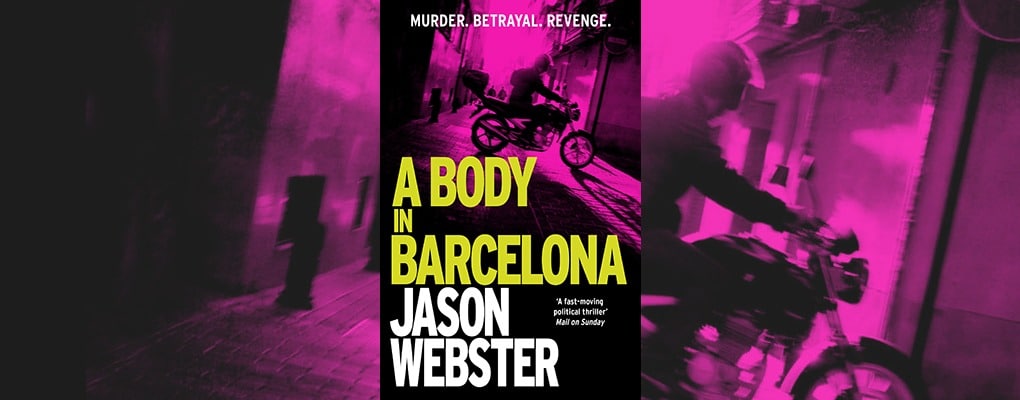Features
Scenes of Crime: A Body in Barcelona by Jason Webster
A large part of Barcelona’s success as a holiday destination – I am convinced – lies in the fact that it still combines a generous helping of seediness with the the cosmopolitan and eclectic charm for which it is famous. Sex shops line the back streets near the Ramblas, drug dealers almost outnumber tourists in the Plaça de Catalunya, and if you stare for too long at Gaudí’s mind-bending architecture your pocket will be picked half a dozen times before breakfast. Gentrification has made in-roads in the city, but is held back by a lust for grottiness that appears to be part of the Barcelona character – the most chic bars catering to the hippest people are to be found in the piss-stenching squares of the Raval district, not in the bourgeois elegance of the Eixample.
For this reason, I hazard, the Catalan capital has overtaken Paris in recent years as the most visited destination in Europe – its curious and intoxicating juxtaposition of architectural magnificence and human decadence and squalor. Decades ago, Paris used to offer a similar combination. As a teenager I would get a thrill by strolling the back streets around the Place St Germain, watching painted women touting for business and avoiding men with scared and intense eyes offering ‘du shit’ in hurried tones. They are no more, farmed out to neighbourhoods on the fringes, and the area now drowns in gift boutiques and over-priced restaurants. In Paris, gentrification has won the battle, and an intangible, dangerous sparkle has been lost as a result.
 Not so – yet – with Barcelona, which still beats with a strange energy, at once inviting and repulsive, that makes it unique. Yet it is not mere vice – the vast array of intoxicants on offer or the ample opportunities for sexual experimentation – that explains its appeal. Crime is a problem, but much of the frisson one senses in the city comes from the questions of identity with which it has traditionally struggled and which have intensified over the past few years: is Barcelona merely Spain’s second largest metropolis? Or the capital of Catalonia, a region which may one day soon become a new, independent country? Judging by the vast number of pro-separatist flags hanging from residents’ balconies, Barcelonans themselves appear to have made their choice. Last year’s abdication in Madrid by King Juan Carlos was largely met with indifference by Catalans, so emotionally divorced do they feel from events ‘over there’.
Not so – yet – with Barcelona, which still beats with a strange energy, at once inviting and repulsive, that makes it unique. Yet it is not mere vice – the vast array of intoxicants on offer or the ample opportunities for sexual experimentation – that explains its appeal. Crime is a problem, but much of the frisson one senses in the city comes from the questions of identity with which it has traditionally struggled and which have intensified over the past few years: is Barcelona merely Spain’s second largest metropolis? Or the capital of Catalonia, a region which may one day soon become a new, independent country? Judging by the vast number of pro-separatist flags hanging from residents’ balconies, Barcelonans themselves appear to have made their choice. Last year’s abdication in Madrid by King Juan Carlos was largely met with indifference by Catalans, so emotionally divorced do they feel from events ‘over there’.
With attempts at a Scottish-style referendum on independence by the regional government and an increasing emphasis on the primacy of Catalan language and culture over ‘Spanish’, the genie of a definitive break with Madrid has been let out of the bottle, and to my mind it is no longer a matter of ‘if’ but ‘when’ this eventually happens. Which means that the real question to ask is how centralists in Spain – traditionally the Army and the political Right – will react. Blood has been spilt many times in the past over this issue. Could it happen again?
Given this tension and colour, the decision to set most of the latest Max Cámara novel in Barcelona took care of itself – hence the title: A Body in Barcelona. Previous books in the series have looked at other issues troubling Spain, from the impact on ordinary people of the economic crisis to the large-scale theft of public money by an increasingly ‘kleptocratic’ political class. Yet the biggest issue in Spain now is an existential one: whether the country can continue in its present form or will break up again – as it has done on numerous occasions throughout its history. And the centre of that current storm is Barcelona.
It was a treat to place the bulk of the action of the book in such a complex, visually rewarding setting. The brooding, narrow lanes of the medieval Barri Gòtic provide a labyrinth of possibilities for delving into the darker corners of a character; the Raval, with its tapestry of immigrants, drugs, prostitutes and some of the best restaurants in the city, makes a memorable spot for murder; the Tibidabo mountain, with majestic views over the city and the Mediterranean, is the perfect venue for plotting high-minded revolution; while the Sagrada Familia, the jewel in Barcelona’s crown, makes a vulnerable and high-profile backdrop for an explosive finale.
Max Cámara, my detective – an anarchist chief inspector in the Spanish National Police – may be more used to the city of Valencia, Barcelona’s uncomfortable sister a few hundred miles down the eastern coast, but the Catalan capital offers him a wealth of crime-fighting opportunities in this novel. Where else could he smoke a joint, plan the overthrow of the regime, visit some of the most beautiful buildings in the world, and get locked in a spiralling bloodbath of separatist violence all on the same day?


Please note: Moderation is enabled and may delay your comment being posted. There is no need to resubmit your comment. By posting a comment you are agreeing to the website Terms of Use.